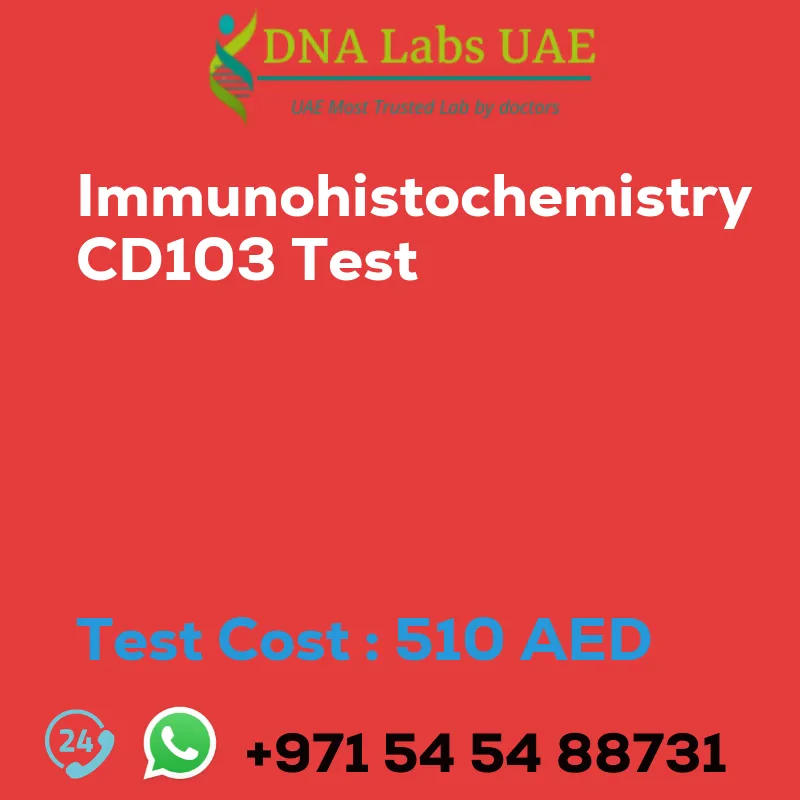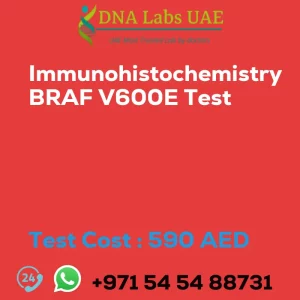IMMUNOHISTOCHEMISTRY CD103 Test: Cost, Symptoms, Diagnosis
At DNA Labs UAE, we offer the IMMUNOHISTOCHEMISTRY CD103 test to detect the presence of CD103 protein in tissues. This diagnostic test is commonly used in pathology for various diseases, including cancer.
Test Details
The IMMUNOHISTOCHEMISTRY CD103 test involves staining tissue sections with specific antibodies that bind to CD103 protein. These antibodies are usually conjugated with a chromogen or a fluorescent dye, allowing for visualization of CD103-positive cells under a microscope.
Components and Price
The cost of the IMMUNOHISTOCHEMISTRY CD103 test is AED 510.0. To perform the test, we require a tumor tissue sample submitted in 10% Formal-saline or a Formalin fixed paraffin embedded block. The sample should be shipped at room temperature. Additionally, please provide a copy of the Histopathology report, the site of biopsy, and the clinical history.
Report Delivery
For the IMMUNOHISTOCHEMISTRY CD103 test, the sample is delivered daily by 6 pm. The report block takes 5 days, tissue biopsy takes 5 days, and tissue large complex takes 7 days.
Method and Test Type
The IMMUNOHISTOCHEMISTRY CD103 test is performed using immunohistochemistry. This test is specifically used for diagnosing cancer and is conducted by hematologists and oncologists in our HISTOLOGY department.
Pre Test Information
Prior to the IMMUNOHISTOCHEMISTRY CD103 test, please provide a copy of the Histopathology report, the site of biopsy, and the clinical history.
Role of CD103 in Pathology
CD103, also known as integrin alpha E, is a cell surface protein primarily expressed on certain immune cells, including T cells and dendritic cells. The presence and distribution of CD103-positive cells in tissue samples can provide valuable information about the immune response and the presence of specific immune cell populations.
Diagnostic and Prognostic Value
The IMMUNOHISTOCHEMISTRY CD103 test is commonly used in the diagnosis of various diseases, such as autoimmune diseases, inflammatory bowel disease, and certain types of cancer. In inflammatory bowel disease, an increased number of CD103-positive cells are often found in affected intestinal tissues. In certain types of cancer, the presence or absence of CD103 expression on tumor cells can provide important prognostic information and help guide treatment decisions.
Overall, the IMMUNOHISTOCHEMISTRY CD103 test is a valuable tool in pathology for assessing the presence and distribution of CD103-positive cells in tissues, providing important diagnostic and prognostic information in various diseases.
| Test Name | IMMUNOHISTOCHEMISTRY CD103 Test |
|---|---|
| Components | |
| Price | 510.0 AED |
| Sample Condition | Submit tumor tissue in 10% Formal-saline OR Formalin fixed paraffin embedded block. Ship at room temperature. Provide a copy of the Histopathology report, Site of biopsy and Clinical history. |
| Report Delivery | Sample Daily by 6 pm; Report Block: 5 days Tissue Biopsy: 5 days Tissue large complex : 7 days |
| Method | Immunohistochemistry |
| Test type | Cancer |
| Doctor | Hematologist, Oncologist |
| Test Department: | HISTOLOGY |
| Pre Test Information | Provide a copy of the Histopathology report, Site of biopsy and Clinical history. |
| Test Details |
The immunohistochemistry CD103 test is a diagnostic test used in pathology to detect the presence of CD103 protein in tissues. CD103, also known as integrin alpha E, is a cell surface protein that is primarily expressed on certain immune cells, including T cells and dendritic cells. The CD103 test involves staining tissue sections with specific antibodies that bind to CD103 protein. These antibodies are usually conjugated with a chromogen or a fluorescent dye, which allows for visualization of the CD103-positive cells under a microscope. The presence and distribution of CD103-positive cells in the tissue sample can provide valuable information about the immune response and the presence of certain immune cell populations. The CD103 test is commonly used in the diagnosis of various diseases, including autoimmune diseases, inflammatory bowel disease, and certain types of cancer. For example, in inflammatory bowel disease, CD103-positive cells are often found in increased numbers in the affected intestinal tissues. In certain types of cancer, the presence or absence of CD103 expression on tumor cells can provide important prognostic information and help guide treatment decisions. Overall, the immunohistochemistry CD103 test is a valuable tool in pathology for assessing the presence and distribution of CD103-positive cells in tissues, providing important diagnostic and prognostic information in various diseases. |








